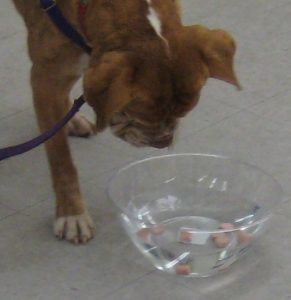
Food is sustenance; it keeps us alive, it fuels our activities, but for most of us it is emotional comfort. Food can trigger wonderful memories of family gatherings, or console us when we’re sick or upset, so no wonder we want to show our love for our pets with food. And it behoves us not to set down a big bowl of “love” so our pets can graze all day long.
The problem is that pets, such as our dogs do not equate food with love; they don’t respect you for leaving the food bowl down all day and they won’t approve of you one way or another. All these things make you feel better about yourself, but it does nothing to enhance your relationship, provide good care or enrichment for your four-legged best friends, and in fact causes a lot of damage in many ways.
When we leave food down all day, we may end up creating a “fussy” eater who doesn’t need to finish all the food, because it’s always there. This lack of “enthusiasm” can cause a knee-jerk response from dog-parents, who might then try to entice the dog into eating by adding table scraps and or changing the dog’s food to another brand, constantly.
Also, dogs who are not on a strict feeding schedule can’t eliminate when they need to, causing all sorts of discomfort when they have to “potty” at irregular times and no one is around to walk them. Some dogs of course, just soil their crates or the house causing “housebreaking” issues which often times is the reason the poor dog is shipped off to a shelter.
Pet-parents who complain that their dog doesn’t listen and or labels them hard to train willful, stubborn, defiant, not food motivated etc. have unwittingly devalued the dog’s food because he has access to it whenever he wants it. However, by controlling access to what the dog wants, it’s so much easier to ask for a behavior in exchange for his kibble or other reinforcers.
Dogs who are not “enthused” about food may be sick, but if the pet-parent is used to a dog that refuses food, sometimes an underlying illness can go undetected.
When a dog has a “job to do”, it is key to your dog’s mental and emotional health. By working for resources either through training, extracting food from a “puzzle toy” or other problem-solving activities, you are providing brain enrichment for your friend and lots of fun and bonding time for you when you participate, unlike putting down a bowl of food where there’s not much for your dog to solve!
Dr. Ian Dunbar, veterinary behaviorist and author, states in a chapter from his book, After You Get Your Puppy, “Without a doubt, regularly feeding a new puppy (or adult dog) from a bowl is the single most disastrous mistake in dog husbandry and training. Although unintentional, the effects of bowl-feeding are often severely detrimental for the puppy’s household manners and sense of well-being. In a sense, each bowl-fed meal steals the puppy’s raison d’etre, its very reason for being.” In other words, food-bowl feeding, especially when the food is left down all day, risks robbing the dog of the very pleasures pet-parents think they’re providing.
